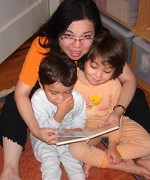Column Name
Title
Born in Tokyo, Mari Kimura grew up there (with a brief period in Ottawa, Canada) and earned her B.A. from the Toho School of Music in Japan. She earned an M.M. at Boston University before coming to Juilliard for her D.M.A. A violinist, she focuses on interactive computer music and composition using extended techniques. She taught at New York University from 1994 to 1996, and has been on the Juilliard faculty since 1998.
Body
When did you first know you wanted to be a musician and how did you come to know it?
When I turned 15, I had to choose whether to go to a music conservatory in Japan (Toho School) or continue in a normal academic school. I wanted to be either a physicist or a musician. My architect father said, “If you want to do physics, you can do it later, but if you want to be a musician, you have to decide now.” So I decided to go into music, and before I knew it, I couldn’t stop being a musician.
Who was the teacher or mentor who most inspired you when you were growing up and what did you learn from that person?
There were many who inspired me over the years. From my violin teachers (Toshiya Eto, Roman Totenberg, Joseph Fuchs, Armand Weisbord) I learned the value of uncompromising pursuit of excellence. From my parents, the value of detailed perfection (my mother, as a law professor, is always perfecting her sentences!) and the steadfastness of pursuing one’s creative originality (my father was a pioneer of solar energy in Japan, and I grew up in a solar house).
What was the first recording that you remember hearing or buying? What was its significance to you?
When I discovered LPs of historical recordings, I especially remember the Capet Quartet’s Debussy and Ravel albums. Despite the acoustic quality, I remember being struck by how original and expressive they were. I love historical recordings, as I don’t get distracted by the superb acoustic qualities of modern recordings and can concentrate on the musicality of the performances.
What’s the most embarrassing moment you’ve had as a performer?
I was performing an interactive computer work I wrote for the first time at the International Computer Music Conference in 1992 in San José, Calif., in front of what was practically an all-male audience (the mix of computers and composers pretty much eliminated women in those days). When I started my piece, my laptop crashed less than one minute into it. I had to quickly recover, rebooting the computer while trying to appear calm in front of the silent audience. My acoustic violin or bow had never “crashed” in front of an audience, so I wasn’t prepared for such an embarrassment!
If you could have your students visit any place in the world, where would it be, and why?
This is a tough question, as I do enjoy so many countries where I have been myself. I have to say that you should pretty much go to the very opposite from where you came from (in both geographical location and attitude). In other words, travel as far and wide as you can, to meet different people and learn about different ways and values of life. Oh—and do it before you have children!
What are your non-music related interests or hobbies? What would people be surprised to know about you?
I have been almost a full-time mom for the past several years, with two children (ages 5 and 7). I also love cooking and entertaining. It probably isn’t surprising as a parent, but my husband and I can pretty much recite some of the Pixar movie dialogues by heart.
If your students could only remember one thing from your teaching, what would you want it to be?
“Define yourself and make yourself irreplaceable as a musician.” I would like my students to go out in the world with a clearer vision of who they are as musicians, of what distinguishes them from others. The students who come my way are already aware of such goals, so it is my pleasure to work with them.
What is your favorite thing about New York City?
As an artist, you can chose to be anonymous and go about your daily life, and you don’t have to conform to a certain custom or culture and are allowed to be who you are. Then, when you do come in contact with other artists, you are inspired and encouraged by the symbiotic energy of their creative minds, and you can choose to soak that energy up whenever you want. This is hard to notice when you are here, but it is very evident when you live elsewhere, without what the city has to offer.





